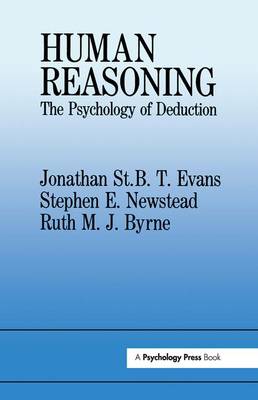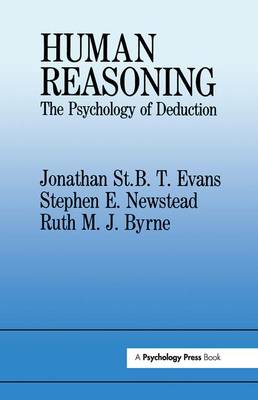
- Afhalen na 1 uur in een winkel met voorraad
- Gratis thuislevering in België vanaf € 30
- Ruim aanbod met 7 miljoen producten
- Afhalen na 1 uur in een winkel met voorraad
- Gratis thuislevering in België vanaf € 30
- Ruim aanbod met 7 miljoen producten
Zoeken
Human Reasoning
The Psychology of Deduction
Ruth M J Byrne, Jonathan St B T Evans, Stephen E Newstead
Paperback | Engels
€ 67,95
+ 135 punten
Omschrijving
Deductive reasoning is widely regarded as an activity central to human intelligence, and as such has attracted an increasing amount of psychological study in recent years. In this first major survey of the field for over a decade, the authors provide a detailed and balanced review of all the main kinds of deductive reasoning task studied by psychologists. Topics covered include conditional and disjunctive reasoning, the Wason selection task, relational inference and reasoning with syllogisms and quantifiers. Throughout the review, a careful distinction is drawn between the main empirical findings in the field and the major theoretical approaches proposed to account for these findings. Discussion of experimental findings is organized around three central questions: What is the extent and limitation of human competence in deductive reasoning? What factors are responsible for systematic errors and biases on reasoning tasks? How is human reasoning influenced by the content in which logical problems are presented? Four major classes of theory are discussed throughout the book. The long established theory that people have a mental logic comprised of formal rules of inference is contrasted particularly with the recently developed mental model theory of deductive reasoning. Explanations of many phenomena, especially biases, are also considered in terms of heuristic processes. Finally, consideration is given to accounts of content and context effects based upon the use of domain sensitive rules or schemas. The book ends with a discussion of research on deductive reasoning in the context of the current debate about human rationality.
Specificaties
Betrokkenen
- Auteur(s):
- Uitgeverij:
Inhoud
- Aantal bladzijden:
- 320
- Taal:
- Engels
Eigenschappen
- Productcode (EAN):
- 9780863773143
- Verschijningsdatum:
- 9/06/1993
- Uitvoering:
- Paperback
- Formaat:
- Trade paperback (VS)
- Afmetingen:
- 170 mm x 229 mm
- Gewicht:
- 476 g

Alleen bij Standaard Boekhandel
+ 135 punten op je klantenkaart van Standaard Boekhandel
Beoordelingen
We publiceren alleen reviews die voldoen aan de voorwaarden voor reviews. Bekijk onze voorwaarden voor reviews.











